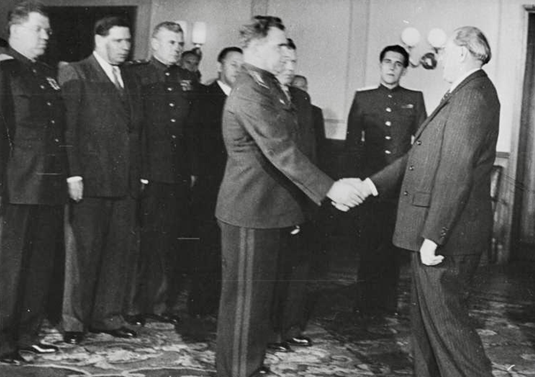Close Contact with Army General Chuikov
- Maria A. Kithcart

- Apr 2, 2023
- 4 min read

Pictured: General of the Army V.I. Chuikov with Soviet Foreign Minister A.Ya. Vyshinsky in East Germany, early 1950s.
During my research on Marshal Chuikov’s time of service in post-war Germany, I discovered an interesting article in a British newspaper which described a book titled Close Contact. In this book, which was published in 1954, British Brigadier C.H. Dewhurst described his experiences as Chief of the British Mission to the Soviet Forces of Occupation in Eastern Germany, a position which he held from 1951 to 1953.
Dewhurst’s writing, which included various interactions with Chuikov and other Soviet officials, referred to an incident related to entertainer Gracie Fields’ Berlin concert for British personnel stationed in Germany held on Friday evening, 11 January 1952. Following her concert, Fields flew out of Berlin to West Germany; however, some of her staff members traveled by Jeep and became lost in the unfamiliar territory.
In the Monday 14 January 1952 edition of The Liverpool Echo, an account appeared that named Fields’ concert director, BBC producer Gordon Crier, as one of three individuals arrested by the Russians after their Jeep was intercepted by the East German police the previous Friday night. Two more British men were also arrested—recording producer Peter Wilson and driver Lance-Corporal Levy. From an article found in the Birmingham Gazette dated 23 January 1952, Gordon Crier apparently spent a week in Russian custody until he was allowed to return to Northolt Airport in West London. In Army General Chuikov’s recorded conversation with Dewhurst, he refers to this incident:
General Chuikov: ‘This [news]paper says you came to interview me yesterday about some British persons who deviated from the official autobahn. You did not come about that.' (He was referring to some members of Gracie Fields' Concert Party who had unaccountably got lost on the return journey from Berlin to Helmstedt. They ended up almost at Leipzig-God knows how! But I knew the Russians would think it all very Machiavellian.)
Self: 'No, General, I did not.'
Chuikov: 'But the paper says you did.’
Self: "That is so.’
Chuikov: [growing incensed] ‘Then how do you account for it?'
Self: 'I don't account for it. I came to see you about another matter, and the papers guessed the subject wrongly.'
Chuikov: 'How did the Press know you came?'
Self: 'Because they probably saw my car on the way. Our reporters are allowed to see and guess what they like.'
Chuikov: 'But the report is not true. It's a lie. It seriously embarrasses our relations.'
Self: 'I agree it's not true; but I'm sorry if that should embarrass our relations.'
Chuikov: 'But the paper precisely says it's true.'
Self: 'Yes, it does.'
Chuikov: [exasperated] "Then you must have told them.'
Self: 'On the contrary. No one in my office, except my adjutant and secretary, knew the subject-matter. And, of course, my High Commissioner, to whom I report.
Chuikov: [unbelievingly] 'I think there must have been a crow on your shoulder when you wrote in your office.'
Self: 'In that case he would have seen the truth, and known exactly what our conversation was, in fact, about.'
Chuikov: 'Anyway, the paper says you came here to speak to me about a certain subject—which was not why you came. That is a very bad thing.'
Self: 'I do not see why it's a bad thing to have a free Press. I regret their mistakes, but there is nothing I, my High Commissioner or my Foreign Office can do to muzzle them. We don't believe in that.'
Chuikov: 'You should stop such reports.'
Self: 'But I have just said, General, we have a free Press. Why should they listen to me?'
Chuikov: [provoked] 'We have a free Press, too, but [as an after-thought] they listen to me. They don't print lies. Anyway, I see you do not wish to do anything. You may go.’
He would never believe that I had not invented a story and given it to the Press. It was, to his mind, a purposely misleading one, and what aggravated him was that neither he, nor his advisers, could make out exactly why I had contrived the whole affair. Hence my summons to his Headquarters. I, incidentally, regretted such meetings as this, for we normally got on well together, and it was an unwritten rule that we kept from the Press what most of our discussions were about.” (64-65).
Without understanding the full context of such a conversation against the backdrop of post-war geopolitics in West and East Germany, one might assume Vasily Ivanovich was being a hard-nosed, demanding leader who purposely challenged the Western Allies during his tenure as the Chief of the Soviet Control Commission. However, it is important to gain an understanding of the strained nature of relations between the Soviets and the West during the Cold War. In a situation where the Western Allies were perceived as contemptuous and untrustworthy, it is no wonder that Chuikov held to strict policies and standards to keep others ‘in check.’ To outsiders, he could very well have been perceived as being difficult. However, Dewhurst wrote that on balance, he and Vasily Ivanovich maintained good relations overall—and this conversation was not characteristic of the whole of their interactions. (64)



